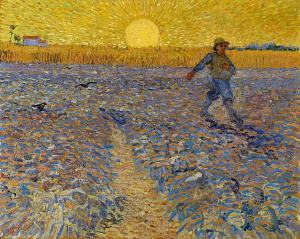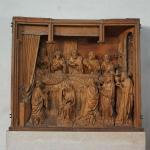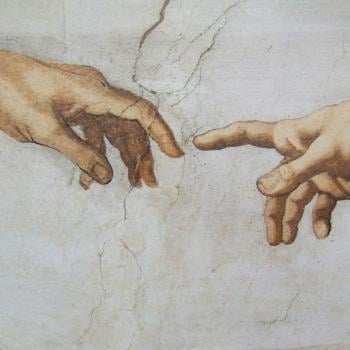
Grace perfects nature because what makes a given nature what it is, is some element of grace. Whatever grace which is later provided to it renews, sustains, and adds to what was initially given. The same, to be sure, is true of existence as well. Both nature and existence come from grace, and are able to be added to or enhanced by grace. Thus, our given nature, our human nature, is good, pure, and undefiled in and of itself, because grace is pure and undefiled. It is not our nature which is ever defiled, it is the person who uses their personal mode of being and tries to transform themselves into individuals who sustain themselves apart from grace, apart from their unity with the rest of their nature, that finds themselves defiled, and so wounded as they no longer possess in themselves the fullness of their natural good. Nonetheless, no matter how much they have cut themselves off from their full participation in their nature, they still possess it within themselves, and so that nature remains with them, meaning, there is always some good left in them, a good which can then be used to serve as a seed or foundation for their eventual restoration.
Christians should discern the grace which exists in everything. They should honor and respect that grace. Sadly, many of them do not. They have not yet given themselves over to the grace that they have been given, and instead, still try to engage the world in their fallen mode of existence, and in doing so, defile the world around them, and its grace. They corrupt the world, and have an indifference to their actions as they think they can leave it all up to God to fix it. But that is not what God wants. Yes, grace can and will repair what has been hurt and defiled in the eschaton, but Christians are meant to be signs of that grace, not fighting against it.
Christians should look to and love creation because of the grace given to it, but also, they should look to and love the one who established creation, the one who gave all that grace. When they do so, when they give themselves over to the giver of grace with love, that is, when they open themselves up to God, they will that their love will connect them with God because God is love; they will then find that once they are united with God through such love, they will be granted more and more grace.
True piety is found in and with love. Love is not love if it not active, and so true piety will show itself in acts of love. False piety will often imitate what is done out of love, but since it is not done with love, it will not connect the person engaging it with the fruit of such love, grace. False piety imitates true piety, but it does so for a different purpose; usually, people act with false piety in order to gain accolades, or at least approval from others. That is, it is an act to look good in front of others. It is done for the sake of appearance. Such a person might go through all the right motions, but they will not receive the grace they need because their intention leads them away from such grace. A person who is full of love, and unites themselves with the love of God, does not need to engage any particular act of devotion, any specific work, for grace; those, however, who imitate piety, who do all kinds of works, while being so self-absorbed, rely only upon themselves and the little grace they already have to sustain them, a grace which cannot sustain them in the same way as the one who is open to an infinite supply of grace due to a bond of love they have with God. Thus, St. Maximos the Confessor warned us:
If it happens that some of us who are Christians are also like this, feigning piety through outward displays while having no works of righteousness, we have only to accept the Word, who in His love for humanity hungers for our salvation, and He will wither the seed of evil in our souls, that is, the evil of pride, so that we may no longer seek to please men, which is the fruit of corruption.[1]
The seeds of evil are the habits which we develop when we act with pride, hatred, or selfish indifference to God or towards others. They often sprout when we engage the pursuit of some inordinate pleasure, when we think we can and should have our desire no matter the consequences of our actions. Pride, certainly, plays a central role here, for it has us engage our personal mode of being, reinforce it with a vision of the self, and then tries to build up and reinforce that self as an individual who exists independent of everything else. False piety works to sustain that self by feeding itself upon the praise it receives from others.
We must act out of love. For it is love which will help us overcome the false self which our pride has seeded in us, for love has us, as it were, die to the self, to think of and consider our beloved instead of looking at ourselves. In doing so, we will be imitating God, for God is love. We will find ourselves becoming who and what we really are meant to be, that is, created representations or images of divine love. Such love will water the seed of grace which was given to us, which has always been there, so that it can rise up and flourish despite all the defilement we have surrounded it with our bad actions.
Thus, there are two types of seeds which we can find in us, those which have been given to us by grace and those which we created for ourselves when we have acted out of selfish pride. Both, at least for a time, can grow in us at the same time. Each of them will try to overcome what the other is doing in us, so that the evil seed will try to snuff out all that is good, while the seed of grace will strive to restore to us what we have lost thanks to such evil. But, as grace is given to us from the infinite, glorious greatness of God. While evil comes from our own making, our evil seeds have a limit and an end to them, while grace does not. More can and will be given to us by the grace Jesus offers us than what we do to counter that grace. But, again, for us to receive all its benefits, we must let love flourish. We must allow ourselves to be transformed by grace, so through it, all our actions are done out of love; then our true nature, and the grace which is found in it, will rise up and reveal itself. The more love flourishes, the easier it will be for us to find the pearl of great price, the kingdom of God, and see it that is already within us. For, no matter how much we have let evil seeds take a hold of us, we still exist, meaning, we still have the seed of grace within us; its roots run deep, and can never be completely overtaken. They can be used to regenerate what has been lost, if they are watered with further grace, and then, once restored to what we were like, we can grow and become something even greater:
For the words, ‘leave the stump of the roots of the tree to grow in the earth,’ make it clear that the transgression did not utterly destroy the seed of nature nor its potentials for goodness, according to which, by resuming its growth, it will be led back through the resurrection to its former natural stature and beauty.[2]
As existence is grace, grace is always in and with us, no matter how much we have strangled it by any and all the evil which we do. We might have severely cut ourselves off from it, so that all that is left is like are a few good roots, but those roots are there, and they are enough. They can be used to bring what was seemingly dead back to life. And this is indeed what Jesus has done for us in and through the incarnation. He has taken our nature upon himself, rooting it to himself, so that it can never be annihilated by evil. He provides to it, and through it, to us, the living water of grace. That grace is what we need for our restoration, before we find, thanks to our union with him, we can and will find ourselves becoming even greater than what we were before, that is, we will be deified. The incarnation, indeed, does this for all things, for us, but for the whole of creation, as all creation will find it has its place in the kingdom of God. But it still is important that we do our part, that is, that we do not to hinder the work of grace and its ability to perfect us; we must embrace love, not some sort of self-love which only look to and references ourselves, but true love which opens us beyond ourselves. Then, the seed of grace, no matter how small it might have become, can grow and become far greater than it has ever been, and what once seemed to have been lost will truly have been found.
[1] St. Maximos the Confessor, On Difficulties in Sacred Scripture: The Responses to Thalassios. Trans. Fr. Maximos Constas (Washington, DC: CUA Press, 2018), 142.
[2] St. Maximos the Confessor, On Difficulties in Sacred Scripture: The Responses to Thalassios, 179-80.
Stay in touch! Like A Little Bit of Nothing on Facebook.
If you liked what you read, please consider sharing it with your friends and family!
N.B.: While I read comments to moderate them, I rarely respond to them. If I don’t respond to your comment directly, don’t assume I am unthankful for it. I appreciate it. But I want readers to feel free to ask questions, and hopefully, dialogue with each other. I have shared what I wanted to say, though some responses will get a brief reply by me, or, if I find it interesting and something I can engage fully, as the foundation for another post. I have had many posts inspired or improved upon thanks to my readers.













